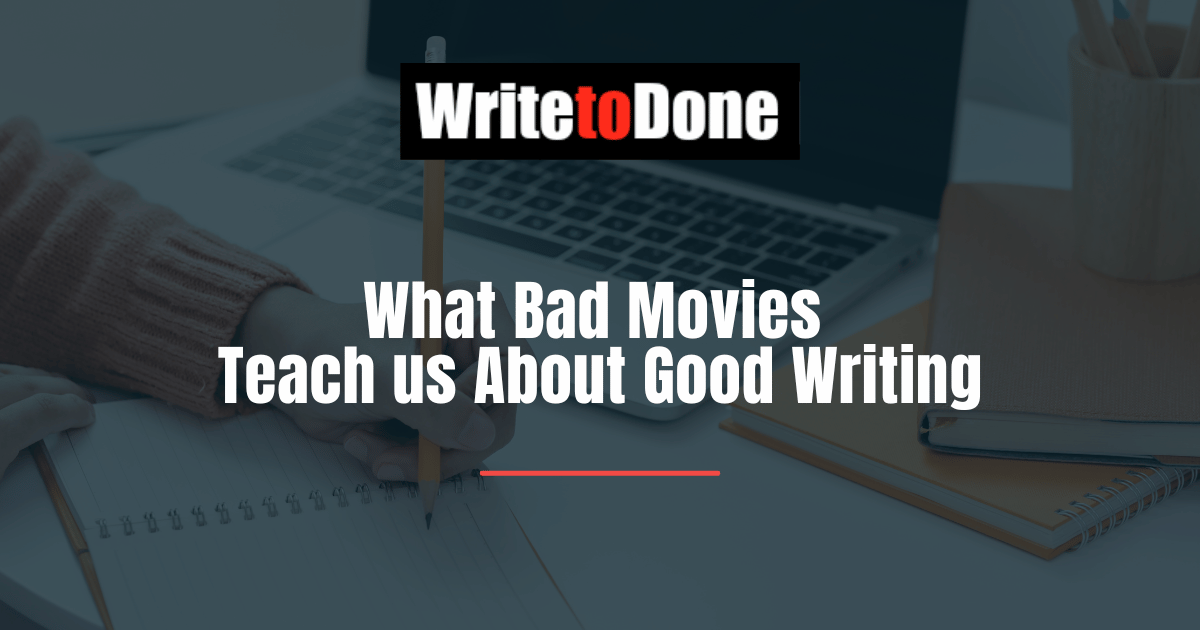A guest post by Jennifer Brown Banks of Pen and Prosper
Have you ever shelled out good money for the show and then felt cheated when the movie was over?
Maybe it was a low budget flick that you held high expectations, or a box-office favorite with high ratings that was low on entertainment value.
Most of us have.
Being a frugal freelancer, I was determined, after having this happen too often as a “sequel”, to gain something redeeming for lost time and money.
When I did a rewind and reflected, I discovered that there was much that bad movies can teach us about good writing, if we are attentive.
Here’s what I discovered.
1. Good writing starts with an awareness of your audience’s needs and expectations. Whether you’re penning a blog post, a play, or an article for an online publication, it’s crucial to consider the motivation of audience members. Are they on board to be entertained? Enlightened? Empowered? Does your content deliver on your title’s promise? Assess then respond accordingly.
2. Insulting your audience’s intelligence is a dumb thing to do. One of the biggest critics of movies, plays, and books happens to be other writers. We can’t help but dissect dialogue, rewrite scenes, and see the oversights that others miss.
For example, even in a fictional piece of work, the scenarios and actions of characters have to be credible. If a play has a setting that takes place in the 1940’s, having the main character use a cell phone to call in an accident would be ridiculous, because they obviously weren’t being used back then.
Get my point?
In my opinion, writers of horror movies tend to be the biggest culprits here. Many will write scenes that are more comical than scary, often times leaving viewers shouting at the TV screen.
Put yourself in your readers’ shoes.
Try to fill in any missing gaps in information. Seek to answer questions that might be potentially posed. Make sure that two plus two equals four. Keeping in mind that articles and blog posts are not supposed to have cliffhangers.
3. Pacing is important to the overall experience. Think of it like a good kiss. If it’s too fast, it won’t engage. If it’s too long, it loses momentum. Good writing starts with an opening that’s brief and straight to the point, and ends with a satisfying closure that feels finished, yet leaves audiences wanting for more.
4. Good writing evokes emotions. Whether it’s the passion that’s felt from Barrett-Brownings, “How do I love thee?” or the giggle we get when we read Dr.Seuss in Green Eggs and Ham. Good writing connects and inspires a response.
5. Good writing, (regardless of genre) has timeless appeal. Consider the works of Shakespeare, Mark Twain, Harper Lee, or even Melville. When writing is quality, old stories still draw new audiences.
To illustrate my point, I’d like to offer a movie made decades ago that continues to excite audiences, young and old. Remember Saturday Night Fever, with John Travolta? I believe it was made back in the ’70s. Last month, a local network aired a rerun, and I was stuck like Velcro, even though I’ve seen it a dozen times.
Why?
Of course the fact that Travolta was the ultimate in eye candy, didn’t hurt. But on an artistic level, I really appreciated the “craftsmanship” that went into this movie.
The attention to detail was great. This movie combined drama, humor, suspense, family dynamics, friendship, conflict, uncertainty, loss, religion, and all the messy elements of life. The script made sense, the characters’ lines were convincing and well-suited, and even the sound track (by the Bee Gees) was amazing!
Another more recent example of a well-written movie is “It’s Complicated” with Meryl Streep and Alec Baldwin. Warning, this is not a P-G movie, folks!
The moral of the story here? Don’t cheat your audience. Give them value for their time.
As writers, if we neglect to observe these outlined practices and principles, we run the risk of losing our fan base. And at the end of the day, good writing really makes good business sense.
So next time you’re at the keyboard composing, use this as a checklist for the “write results”. Doing so will insure that your work will be worth the price of admission.
Jennifer Brown Banks is a WTD Top 10 Blogs for Writers Contest finalist for 2011. Jennifer is a veteran freelance writer, pro blogger, and relationship columnist, and helps writers and businesses turn their passion into pay at her blog Pen and Prosper.
________________________________________________________________________________________________
Do you want to be an outstanding blogger? We’ll show you how. Join our spectacular training for bloggers, the A-List Blogger Club. Click below to find out more:

















